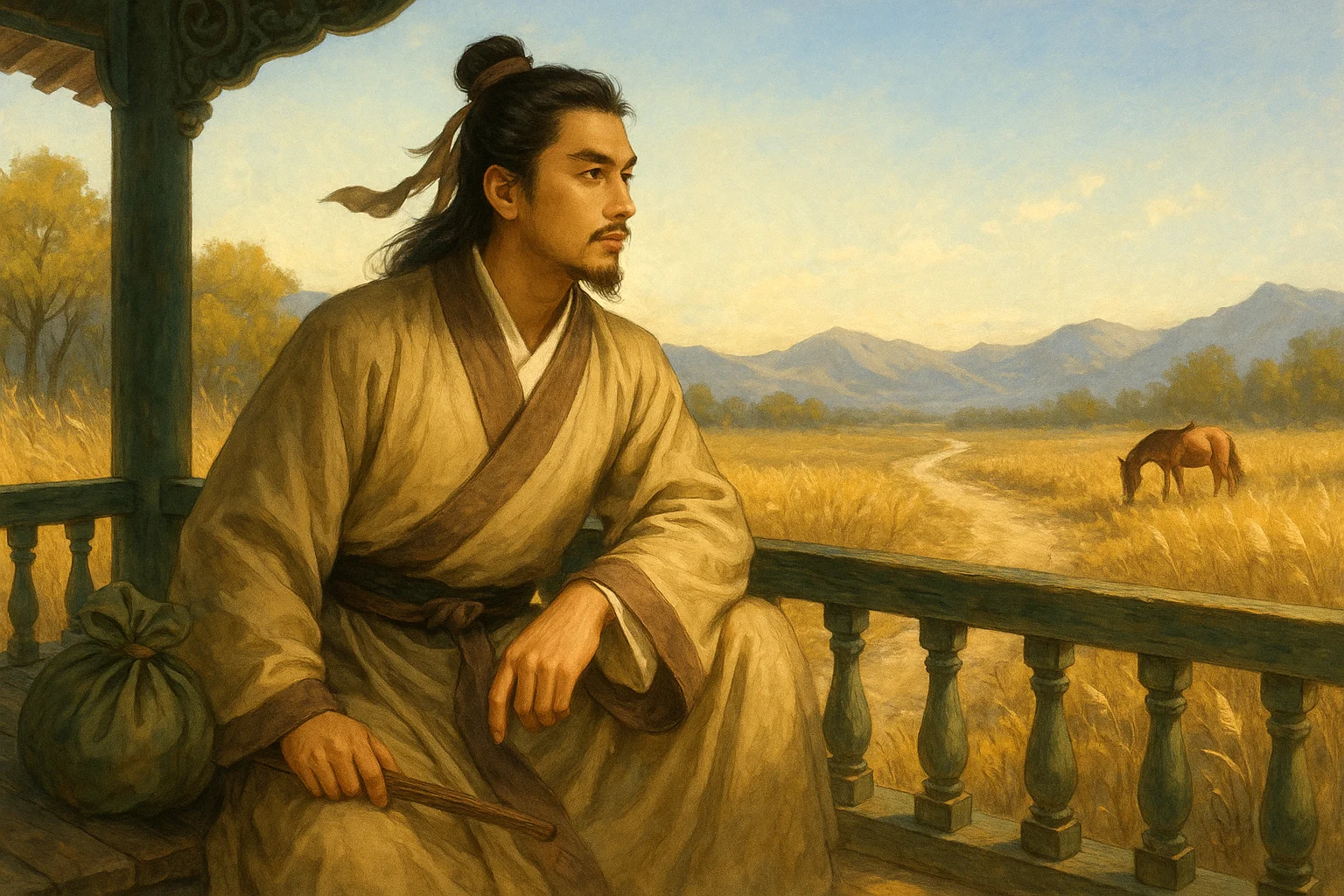Farmers cheer the rain’s embrace,
Neighbors call with laughing face.
Springs flood ditches, banks collapse,
Wheat stands tall—mulberries lapse.
Sons chase calves to pasture new,
Guests wait for the hen in stew.
Scratching head by vine-clad door,
As proud as kings of yore!
Original Poem
「田家」
司空曙
田家喜雨足,邻老相招携。
泉溢沟塍坏,麦高桑柘低。
呼儿催放犊,宿客待烹鸡。
搔首蓬门下,如将轩冕齐。
Interpretation
This pastoral poem by Sikong Shu, a prominent figure among the "Ten Literary Masters of the Dali Era," captures rural life with unadorned authenticity. Likely composed during the poet's countryside retreat or travels, it depicts a farming community's jubilation after life-giving rains, revealing Shu's deep appreciation for agrarian simplicity. The work stands as a quiet manifesto of contentment, where peasant joys rival—and even surpass—the trappings of officialdom.
First Couplet: "田家喜雨足,邻老相招携。"
Tiánjiā xǐ yǔ zú, lín lǎo xiāng zhāo xié.
Farmers rejoice in rain's abundance— / Neighbors, arm in arm, come celebrating.
The opening celebrates rain as agricultural benediction. "Arm in arm" (相招携) paints a tactile portrait of village solidarity, where weather binds community. The couplet's buoyant rhythm mirrors the farmers' lightened steps.
Second Couplet: "泉溢沟塍坏,麦高桑柘低。"
Quán yì gōu chéng huài, mài gāo sāng zhè dī.
Springs breach ditches, earthworks crumble— / Wheat shoots tower where mulberries stoop.
Nature's exuberance spills beyond human control, yet the damage feels incidental amid the fertility it enables. The visual contrast—"tower"/"stoop"—measures growth's triumph, with grain outstripping trees in this reversed hierarchy of vitality.
Third Couplet: "呼儿催放犊,宿客待烹鸡。"
Hū ér cuī fàng dú, sù kè dài pēng jī.
"Hurry the calves to pasture!" fathers call— / A guest arrives; the stewpot readies fowl.
Domestic bustle animates the scene. The parallel imperatives—children herding, hosts cooking—weave work and hospitality into a single fabric of rural reciprocity. The specificity of "fowl" (鸡) over generic "meat" grounds the poem in farming reality.
Fourth Couplet: "搔首蓬门下,如将轩冕齐。"
Sāo shǒu péngmén xià, rú jiāng xuānmiǎn qí.
Scratching my head beneath thatch eaves— / This peace equals any court official's pride.
The poet-philosopher's epiphany: a thatched roof (蓬门) frames happiness as complete as any mandarin's ceremonial hat (轩冕). The gesture "scratching my head"—simultaneously puzzled and content—embodies the poem's thesis: true dignity springs from unpretentious living.
Holistic Appreciation
This pastoral poem, brimming with rustic charm and poetic philosophy, vividly depicts scenes of farm labor, neighborly gatherings, and daily life following a timely rainfall. Its structure is clear and its rhythm lively. From the external natural blessing of "welcome rain" to the intimate interactions of village camaraderie, and further to domestic routines and hospitality customs, the poet captures the simple warmth of rural life with remarkable authenticity.
Eschewing ornate diction or expressions of hardship, the poem records fleeting moments of agricultural life in a perfectly natural tone. It conveys not only gratitude toward nature but also a portrait of inner tranquility and contentment. The concluding line, "as if wearing courtly caps and robes," crystallizes the poem's spiritual essence, revealing the poet's serene detachment despite personal adversity—a hallmark of the restrained and leisurely style associated with the "Ten Literary Masters of the Dali Era."
Artistic Merits
- Narrative Blending Scene and Life's Essence: The poem seamlessly merges post-rain rural landscapes with human activity, creating a complete tableau of life that balances movement with tenderness, suffused with the fragrance of earthly existence.
- Natural Language, Unadorned Style: Employing plain and intimate phrasing without classical allusions or embellishment, it gently articulates joy and leisure, carrying the cadence of folk speech.
- Profound Closing, Philosophical Depth: The line "as if wearing courtly caps and robes" speaks with subtle profundity, expressing the poet's peaceful indifference to worldly honors and distilling the poem's central tenet with endless resonance.
Insights
More than a vibrant pastoral scene, this poem articulates a philosophy of life. Amidst material simplicity and humble surroundings, the poet discovers serenity, kinship, and freedom more precious than "courtly honors"—a true inner abundance. It reminds us that in life's complexities, relinquishing the burdens of fame and fortune to return to nature and daily rhythms can yield a sense of fulfillment and peace. With the plainest language, this poem achieves the deepest insights, standing as a model of "subtle yet flavorful, simple yet moving" artistry.
About the poet

Sikong Shu (司空曙), c. 720 – c. 790, courtesy name Wenming, was a native of Guangping (present-day Yongnian County, Hebei Province). A renowned mid-Tang dynasty poet, he was one of the "Ten Literary Masters of the Dali Era," alongside Lu Lun, Qian Qi, Han Hong, Li Duan, and others. Though his life lacked illustrious achievements, his poetry—marked by genuine emotion in simplicity and profound contemplation in solitude—secured him a unique place in mid-Tang literary circles.












